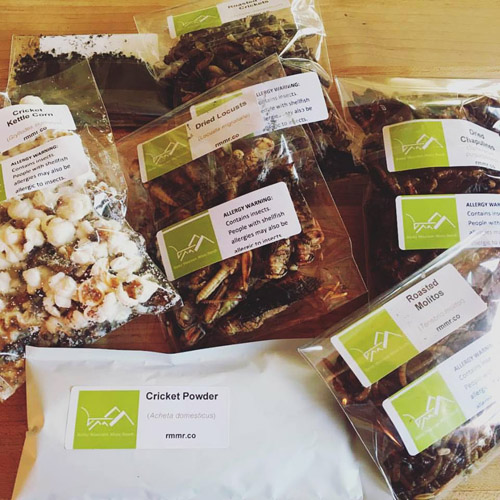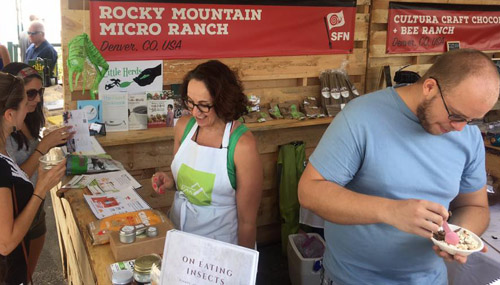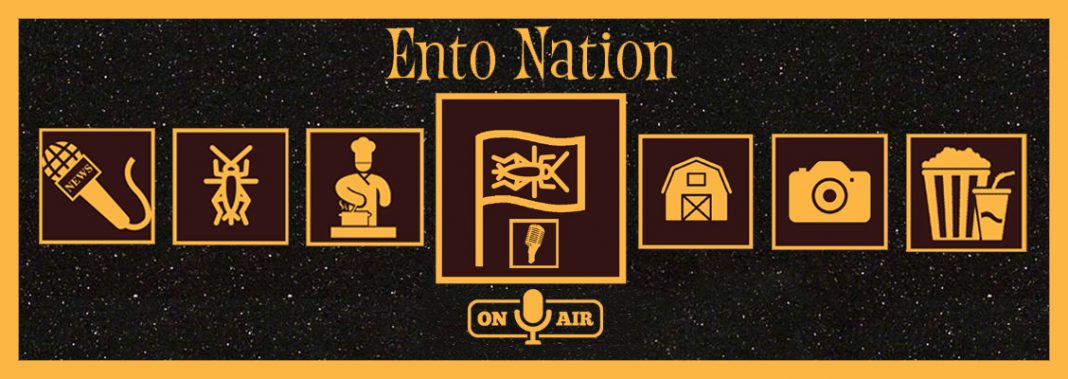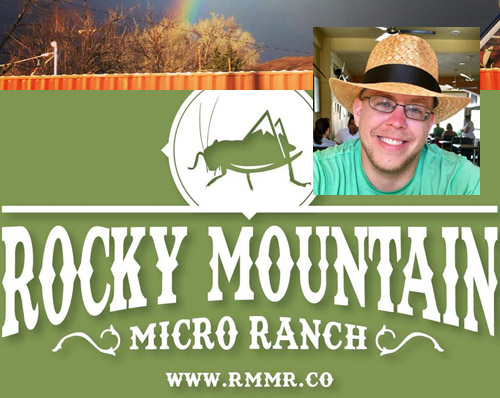Kyle Conrad, aka The Bug Overlord, is COO of Rocky Mountain Micro Ranch…I think he also speaks Swahili. Go Kyle!
Interesting read…
Why Micro Ranch?
By Kyle Conrad
“One day I want to raise bugs for people to eat,” is not a sentence I heard even once when I was growing up in Colorado. No one I knew was dreaming of being a bug rancher over an astronaut. Now the United States sports a growing number of companies with people like me, devoting our careers to just that. Perhaps the most common question I still get when I let people know that I am a bug rancher raising my livestock for human consumption is, “Why?”
Even though I’ve been an ambitious bug guy since day one, it took me 27 years for that passion to metamorphose into its new goal of being one of the best insect ranchers in the world. According to my parent’s legend, I started my love of bugs as soon as I could crawl after the scorpions across our Phoenix living room floor, giving them another reason to want to move away besides their melting shoe soles. As I grew up mostly in Colorado, I steeped myself in bugs through nature romps and the devouring of any information source I could find on the topic. I knew the word “entomologist” before my parents did, and slightly shocked them when I announced my career goal in middle school. Yet I hardly ever came across the idea of eating bugs through all my diving into the topic.

Even while studying Biology and Entomology at Colorado State University, I learned the word “entomophagy” (eating of insects), but it was filed away in my brain to largely mean shrews, lizards or other critters. The “chirpy chip cookie” and “mealworm chex mix” we tried in one entomology class was just an oddity. I was more perplexed by the fact there were so few entomologists trying to tackle one of the largest groups of animals on our planet, by far. A group of animals that kill more people than even people manage to, that are one of the biggest dangers to those who do endeavor to feed the rest of us while at the same time being essential for feeding us through mechanisms like pollination. Hopefully soon, even more directly responsible for feeding the majority of us. A group of animals that we hardly can estimate the quantity and scale of their effects on our societies and ecosystems.
When I joined the Rocky Mountain Micro Ranch (RMMR) team, doubling its size, the founder and CEO of the first and only edible insect farm in Colorado, Wendy Lu McGill, was looking for an Entomologist to take over operations. I had recently returned from living in Tanzania, East Africa, as an Environmental Volunteer in the Peace Corps for a few years. In college I learned a lot of science, in the Peace Corps I learned a lot more about myself and the world. As I was endlessly enriched by the difficult work in a new culture I become as enthralled by the boundlessly complex problems of food security as I had previously been with entomology. Most of my work combined the two, doing much of it in the beekeeping realm.
In my mind food security mirrored entomology, there were so many problems in the complex fabric of those deceptively simple words, so much to be done. Yet even while I lived in that other culture, one which ate wild caught grasshoppers and termites regularly, I did not put one and one together. I didn’t think farming insects could be an answer to a lot of the food security problems I was working on. The passion of Entomology I always had was now paired with a burning passion for helping improve food security, two words that try to encompass the flabbergastingly difficult idea, “how do we humans feed everyone enough, forever?” Wendy Lu’s offer was the first time it finally clicked, that my passions could be put hand in hand.
We as humans have been eating arthropods for a very long time, though mostly through wild collection not cultivation, and although the majority of our cultures around the world still embrace the practice in many forms, it is an idea that in the minds of many should grow if we are going to solve the food security challenges we face. There are many reasons, and I encourage you to look into them. Arthropods like cricket, black soldier fly and mealworms have been studied a lot in terms of future human consumption livestock, but remember they are merely three of the estimated 6 to 10 million species of insects and closely related arthropods. Some reports state there are already hundreds if not thousands of those species regularly consumed by people somewhere in the world. Even though most of those millions of species we still don’t have a name for let alone understand their biology and behavior enough to know if or how we could ranch them.

For comparison, there are under 10 species of cows in the world. Many of the preliminary studies show that when compared to other animal food sources, such as cows or chicken, arthropods are better in a lot of ways. Using less inputs (feed, water, and space) to produce more, high quality food. However, when you go forth to grow bugs, the challenges begin to mount. What do you do if your herd gets sick, what’s the veterinarian’s number who works with crickets? What is the best thing to feed them, the best way to house them? How do you keep them safe for human consumption? How do you sell them? Or ship them? What are the associated laws and regulations?
In some places in the world some of these problems have been addressed informally for many generations, such as in South East Asia. But there is a lot of work that needs to be done to figure out how to do it as sustainability sound, economically viable, and safely as possible. All kinds of work – because it is all kinds of work, a huge, diverse network of things and people, that brings a piece of food that nourishes your body from an idea in a farmer or rancher’s mind to your mouth. I’m very excited by these problems, and think there is boundless room for people of all talents and passions to help us continue to improve the future of arthropod ranching which should play a part in addressing our food security needs. Here in America there is also much cultural work we need to continue to do to re-normalize the idea of eating “bugs,” maybe even make the concept of growing up to become a bug rancher a little heroic like astronauts. Besides, it’s a very high chance those astronauts will be eating bugs intentionally themselves very soon.
~END~
Kyle Conrad is the COO of Rocky Mountain Micro Ranch.
Click here to listen to our interview with Wendy Lu McGill, CEO of RMMR on the Ento Nation podcast.















